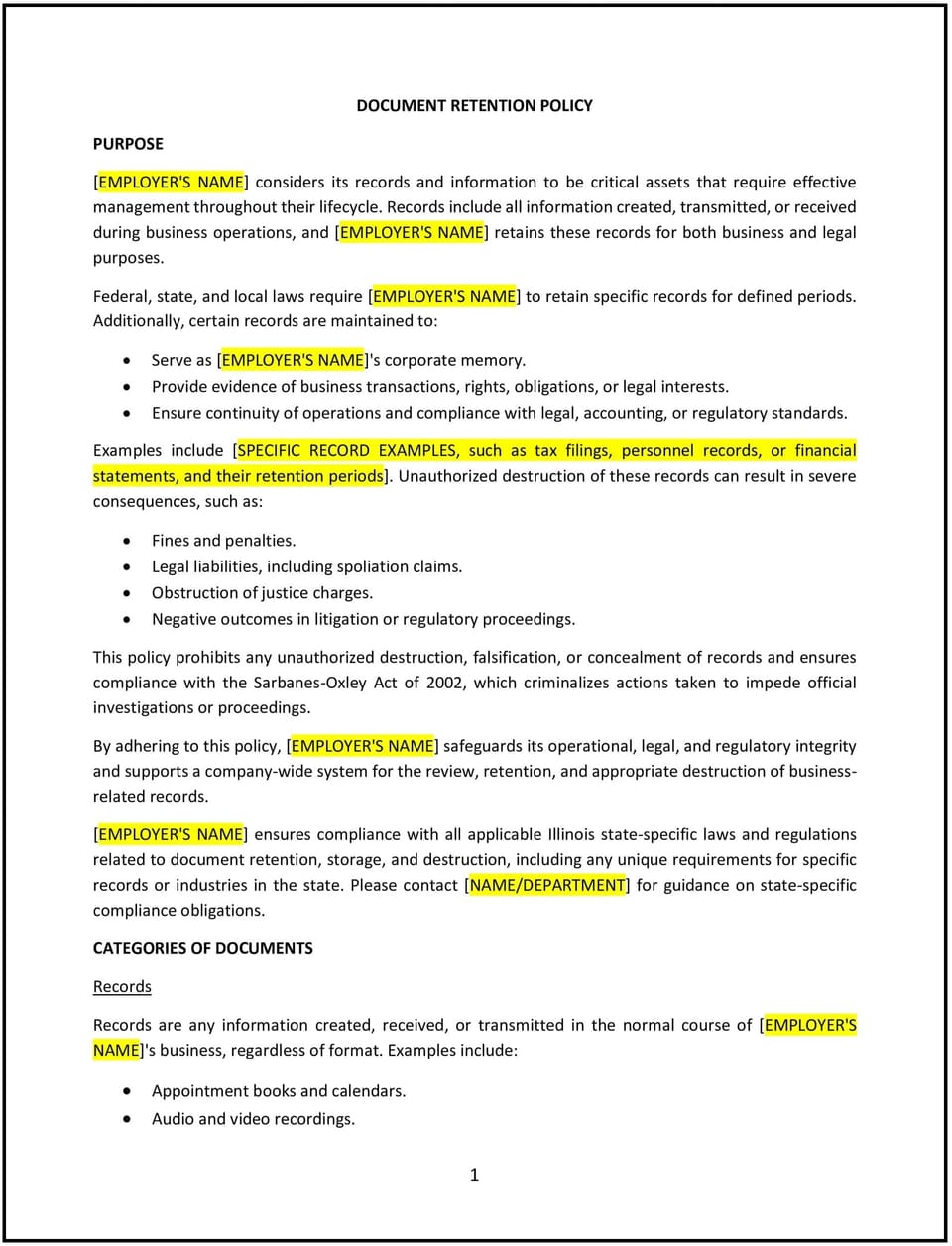Document retention policy (Illinois): Free template

Document retention policy (Illinois)
This document retention policy is designed to help Illinois businesses establish clear guidelines for managing, storing, and disposing of business records. It outlines retention periods, compliance requirements, and procedures for safeguarding sensitive information to promote effective record-keeping and alignment with Illinois laws.
By adopting this policy, businesses can streamline operations, mitigate risks, and support compliance with applicable regulations.
How to use this document retention policy (Illinois)
- Define scope: Specify the types of documents covered by the policy, such as financial records, contracts, employee files, and tax documents.
- Establish retention periods: Outline how long various records must be kept based on Illinois laws and industry standards.
- Provide storage guidelines: Specify where records should be stored, whether digitally or physically, and include security requirements to protect sensitive information.
- Address disposal procedures: Detail how records should be securely destroyed once the retention period has ended, such as shredding or permanent deletion.
- Assign responsibilities: Identify the roles or departments responsible for managing, reviewing, and disposing of records.
- Include legal compliance: Ensure the policy reflects relevant Illinois regulations, such as those governing tax records, employment documents, and data privacy.
- Monitor adherence: Regularly review compliance with the policy to ensure records are managed in line with legal and operational requirements.
- Offer training: Educate employees on proper record-keeping practices and the importance of safeguarding sensitive information.
Benefits of using this document retention policy (Illinois)
This policy provides several benefits for Illinois businesses:
- Supports compliance: Helps businesses align with Illinois laws and industry regulations for record retention.
- Reduces risks: Minimizes the potential for legal issues by ensuring proper management of important documents.
- Improves efficiency: Streamlines record-keeping processes, saving time and resources.
- Protects sensitive information: Establishes guidelines for securely storing and disposing of records to prevent data breaches.
- Enhances accountability: Clarifies responsibilities for managing documents and maintaining accurate records.
Tips for using this document retention policy (Illinois)
- Communicate the policy: Share the policy with employees and ensure it is included in the employee handbook or internal resources.
- Use technology: Implement document management systems to track retention periods and automate disposal processes.
- Conduct regular audits: Periodically review records to ensure they are retained or disposed of according to the policy.
- Protect sensitive data: Use encryption, access controls, and secure storage methods to safeguard confidential information.
- Update regularly: Revise the policy to reflect changes in Illinois laws, business practices, or technological advancements.
Q: What types of documents are covered under this policy?
A: This policy applies to various records, including financial documents, employee files, tax records, contracts, and customer information.
Q: How long must records be retained?
A: Retention periods vary based on the type of record and applicable Illinois laws. Specific timeframes are outlined in this policy.
Q: What are the procedures for securely disposing of records?
A: Records must be destroyed using methods such as shredding for physical documents or permanent deletion for digital files to protect sensitive information.
Q: Who is responsible for managing document retention?
A: Designated employees, departments, or managers are responsible for ensuring compliance with this policy.
Q: How does the company protect sensitive records?
A: Sensitive records are safeguarded through encryption, access controls, and secure storage to prevent unauthorized access or breaches.
Q: What happens if the retention policy is not followed?
A: Non-compliance may lead to operational inefficiencies, legal risks, or data breaches. Corrective actions will be taken to address any violations.
Q: How often is this policy reviewed?
A: This policy is reviewed annually or whenever significant changes occur in Illinois laws, workplace practices, or technology standards.
Q: Are employees trained on document retention practices?
A: Yes, employees receive regular training on proper record-keeping, storage, and disposal practices to align with this policy.
This article contains general legal information and does not contain legal advice. Cobrief is not a law firm or a substitute for an attorney or law firm. The law is complex and changes often. For legal advice, please ask a lawyer.


